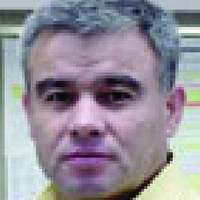
Myrza Karimov
Myrza Karimov is a distinguished alumnus of the Department of Educational Policy and Administration, College of Education and Human Development, at the University of Minnesota. He graduated in 1997 with a Master's of Arts in Comparative International Development Education.
Mr. Karimov is currently an education specialist with the United States Agency for International Development (USAID) in Bishkek, Kyrgyzstan. In this position he is responsible for coordinating all of USAID's educational projects Kyrgyzstan. This position reflects his philosophy that radical reform of the education process is essential to allow Kyrgyzstan to move away from its communist past and become competitive in the global market.
Upon returning to Kyrgyzstan in 1997, Mr. Karimov worked in the field of international and intercultural communication at Arabaev Kyrgyz State Pedagogical University. From 2001 to 2003 he was vice rector for international relations and associate professor in the Department of Linguistics and Intercultural Communication. In 2001, he published a text book, "Education Management," the first of its kind in the country. He also set up the first web site for the university, which has been valuable in attracting international students and faculty.
In his work outside the university, he was a leading member of the Educational Team of the Kyrgyz parliament, which was tasked with drafting a new Education Law. He has also been successful in establishing linkages and raising funds from the European Union, strengthening cultural and educational links with Thailand and Vietnam, and has been a leader in the Newly Independent States College and University Project, funded by the U.S. Department of State to improve educational leadership in Kyrgyzstan. This project is co-managed by the Arabaev Kyrgyz State Pedagogical University and the University of Minnesota.
In naming Mr. Karimov as a winner of the Distinguished Leadership Award for Internationals, the selection committee cited his understanding of the key importance of education reform to the future of Kyrgyzstan, his role as a change agent in this field, as well as his leadership in internationalizing the curriculum by reaching out not only to the U.S. but also to countries in South East Asia.
 Global
Global